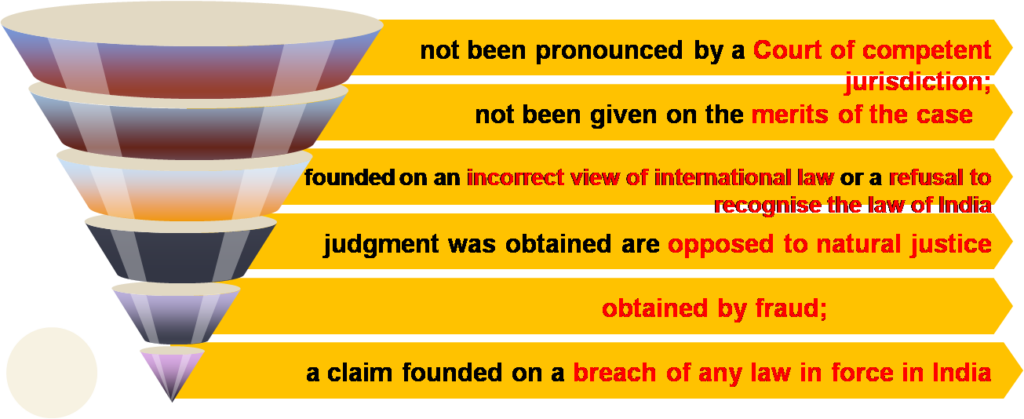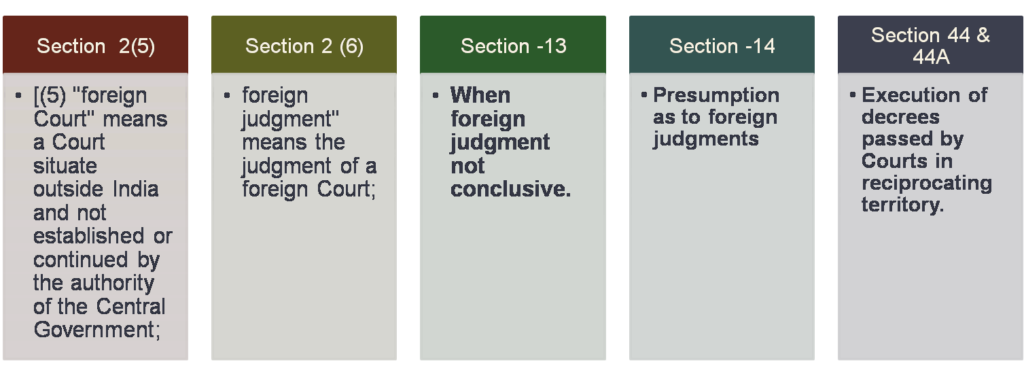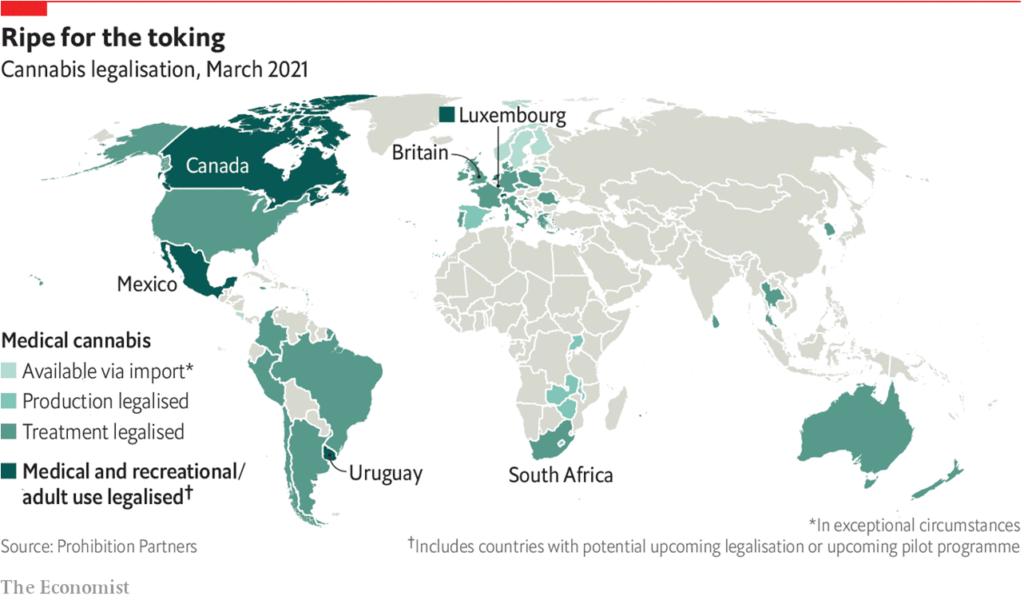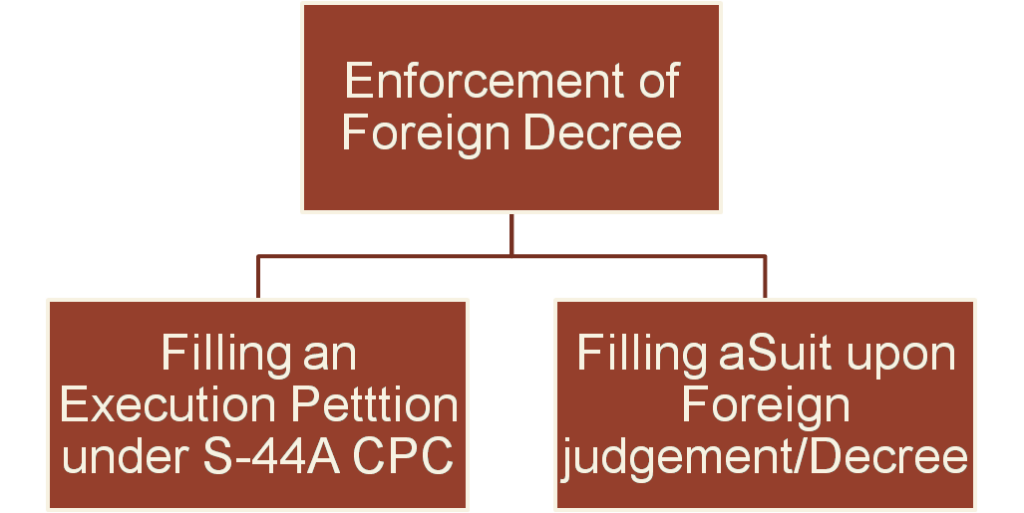When Foreign Judgemnt Not Conclusive.
Section -13
A foreign judgment shall be conclusive as to any matter thereby directly adjudicated upon between the same parties or between parties under whom they or any of them claim litigating under the same title except-
(a) where it has not been pronounced by a Court of competent jurisdiction;
(b) where it has not been given on the merits of the case;
(c) where it appears on the face of the proceedings to be founded on an incorrect view of international law or a refusal to recognise the law of 1[India] in cases in which such law is applicable;
(d) where the proceedings in which the judgment was obtained are opposed to natural justice;
(e) where it has been obtained by fraud;
(f) where it sustains a claim founded on a breach of any law in force in 1[India].
Section -13 – Circumstances when a Foreign Jugment is Not Conclusive

Introduction
Section 2(6) of the Code of Civil Procedure, 1908 (CPC) defines a foreign judgement as a judgement of a foreign court. A foreign court is defined by Section 2(5) of the CPC as a court situated outside India and not established or continued by the authority of the Central Government. CPC dictates the procedure for the enforcement of foreign judgements in India and requires the judgement or decree passed by the foreign court to be conclusive in nature and it should have been decided on the merits of the case by a court of competent jurisdiction. Section 13 of the CPC underlies the principle of res judicata and any judgement passed by a foreign court can be enforced in India and will act as res judicata between the subject parties.
Provision under CPC 1908 to deal with Foreign Judgement

Validity OF Foreign Judgement
Foreign Judgments are generally conclusive in all respects between the parties except for matters outlined in Section 13 of CPC. The foreign judgment would be inconclusive if it fails to pass the test of the provisions laid out in Section 13 (Middle East Bank Ltd. vs. Rajendra Singh Sethia, AIR 1991 Cal 335).
Section 13 of CPC provides that a foreign judgment can be rendere inconclusive in the event judgment has:-
Not been pronounced by a court of competent jurisdiction,
obtained without any merits of the case,
Is not recognized by the Indian law,
Violates the principles of natural justice,
been obtained by fraud, and
Stands to breach any Indian law in force at the time.
If the judgment covers within any of the above, such judgment(s) will cease to be conclusive as to any matter, thereby adjudicated or decided upon. The judgment will then be open to a collateral attack on the grounds mentioned in the clauses under section 13.
Section 13 extends the Rule of Res Judicata for the Foreign judgements
In D. Viswanathan v. Rukun ul Mulk Sayed Abdul3 , the Supreme Court held that while considering whether a judgement of a foreign court is conclusive, the courts in India will not require to go into the merits of the claim and it shall be conclusive as to any matter directly adjudicated between such parties subject to exceptions enumerated under Section 13, clause (a) to (f)
Foreign Judgment not by a competent court
It is a basic fundamental principle of law that the judgment or order passed by the court which has no jurisdiction is void. Thus, a judgment of a foreign court to be conclusive between the parties must be a judgment pronounced by a court of competent jurisdiction. Such judgment must be by a court competent both by law of the state which has constituted it and in an international sense and it must have directly adjudicated upon the matter which is pleaded as Res judicata.
- i. Where a person is the subject of the foreign country in which the judgement has been obtained;
- Where he was a resident in the foreign country when the action was commenced and the summons was served on him;
- Where the person in the character of the plaintiff selects the foreign court as the forum for taking action in which forum he issued later;
- Where the party on summons voluntarily appeared; and
- Where by an agreement, a person has contracted to submit himself to the forum in which the judgement is obtained
Jurisdiction Of Foreign Court

Private international law, also known as “conflict of laws” in certain jurisdictions, refers to the law regulating private relationships across national borders, or in other words involving a foreign element.
PIL deals with three main issues:
a)the jurisdiction of a court to deal with the case (international jurisdiction),
b)the law applicable to the case, and
c)the recognition and enforcement of foreign judgments. Administrative and judicial cooperation relating to these issues are also covered by PIL.
Foreign Judgement not on Merits
A judgement is on merits when decision is given after taking evidence and after applying mind on truth or falsity of facts as well as the contention of the parties. Decision which was passed on default of part of defendant without trial on evidence was held not on merits
The Actual test for deciding whether the judgment has been given on merits or not is to see whether it was merely passed as a matter of course, or by way of penalty of any conduct of the defendant, or is based upon a consideration of the truth or falsity of the plaintiff”s claim.
In the case of Gurdas Mann v. Mohinder Singh Brar[11], the Punjab & Harayana High Court held that an exparte judgment and decree which did not show that the plaintiff had led evidence to prove his claim before the Court, was not executable under Section 13(b) of the CPC since it was not passed on the merits of the claim.
Foreign Judgment not on Merits

Foreign Judgement against International or Indian Law:
When a judgement passed by a foreign court is based upon an incorrect legal view or in defiance of Indian laws where such laws are applicable, it is not conclusive and the matter adjudicated therein is not enforceable in India.
Thus, when a suit is filed in England for the breach of a contract formed in India and the English Court wrongfully applies English law, it is to be noted that this situation is covered by the clause being discussed as it is a fundamental principle of private international law that the rights and liabilities of the parties to a contract are determined by the place of contract (lex loci contractus)
Under Section 13(c) of CPC, the following proposition may be laid
A judgment passed by a foreign Court upon a claim for immovable property, situated in the Indian territory may not be enforceable since it violates International Law.
A judgment passed by the foreign Court, where before a contrary Indian law had been shown, but the Court had refused to recognize such law, then that Judgment or decree may not be enforceable, except where the proper law of contract is the foreign law.
Foreign Judgement opposed to natural justice:
It is the essence of a judgment of court that it must be obtained after due observance of the judicial procedure i.e., the court rendering the judgment must observe the minimum requirements of natural justice. It must be composed of impartial persons, who must act in a fair and justified manner, without bias, and in good faith, it must give reasonable notice to the parties to the dispute and each party should be given equal opportunity of presenting their case. A judgment which suffers from such infirmities on the part of a judge will be regarded as a nullity and the trial “coram non judice”
However, it is to be noted that the word ‘natural justice’ in this clause refers to the irregularities in the procedure rather than the merits of the case. Thus, a foreign judgement by a competent court is conclusive as long as it adheres to the correct judicial procedure even if it is pronounced on a wrong legal view or evidence. Thus a foreign judgement is not open to criticism by this clause if the principles of natural justice have been complied with.
Where it has been obtained by fraud
Fraus et jus nunquam cohabitant is a Latin term which means that fraud and justice never dwell or agree together. In other words, it means that law cannot exist with deliberate falsehood or fraud.
Or
Fraus et Dolus Nemini Patrocinari Debent is a legal maxim, used in India, with the following meaning: Fraud and deceit should defend no man. (Pranab Kumar Dey v. Dibrugarh University AIR 1988 Gau. 61.)
It is a well settled principle of Private International Law that if foreign judgments are obtained by fraud, it will not operate as res judicata.
It is a fundamental principle of law that a judgement obtained by fraud is not conclusive, irrespective of whether it was passed by a domestic court or a foreign court. Although it is not possible to show that the court was ‘mistaken’, it can however be proven that the court was ‘misled’.
Where the plaintiff misleads the Foreign court and the judgment or decree is obtained on that basis, the said Judgment may not be enforceable, however, if there is some error in the judgment then the Indian courts will not sit as a Court of appeal to rectify the mistake or error.
In the case of Satya v. Teja Singh the Supreme Court held that since the plaintiff had misled the foreign court as to its having jurisdiction over the matter, although it could not have had the jurisdiction, the judgment and decree was obtained by fraud and hence inconclusive.
Foreign Judgement founded on breach of Indian Law:
A foreign judgement in breach of the laws in force in India is not conclusive and it considered being null and void. The objective of this clause is to ensure that no foreign law can offend the public policy of our country. Thus, a decree for divorce which has been passed in a foreign court cannot be enforced in India if Indian law does not approve of such divorce. The rules of private international law cannot be adopted blindly and mechanically and every case must be decided in accordance with Indian law and foreign law must not offend our public policy

Presumption as to Foreign Judgement
CPC Section 14.
Section 14 of the Code declares that the Court shall presume upon the production of any document purporting to be a certified copy of a foreign judgement that such judgement was pronounced by a court of competent jurisdiction unless contrary is proved.
Such presumption may be displaced by proving want of jurisdiction. In Narsimha Rao v. Venkata Laxmi, the Supreme Court held that if for admissibility of such copy, further conditions are required to be fulfilled, it can be admitted in evidence only if that condition is satisfied
The Court shall presume upon the production of any document purporting to be a certified copy of a foreign judgment that such judgment was pronounced by a Court of competent jurisdiction, unless the contrary appears on the record; but such presumption may be displaced by proving want of jurisdiction.

Photostat copy per se is not inadmissible in evidence. It is inadmissible because it has not further been certified by the representative of our Central Government in the United States as required by Section 86 of the Act. The expression “certified copy” of a foreign judgment in Section 14 of the Code has to be read consistent with the requirement of Section 86 of the Act.
Y. Narasimha Rao And Ors vs Y. Venkata Lakshmi And Anr on 9 July, 1991
Enforcement of Foreign Judgments and Decrees in India
Under the Indian laws, there are two ways of getting a foreign judgement or decree enforced in India either by filing an Execution Petition u/s 44A of the CPC subject to conditions given u/s 13 or by filing a suit upon the foreign judgement/decree.

In India, execution of decrees, whether foreign or domestic, is governed by the provisions of the Code of Civil Procedure, 1908 (CPC). Under the Indian laws, there are two ways of getting a foreign judgement enforced in India either by filing an Execution Petition u/s 44A of the CPC subject to conditions specified therein are fulfilled or by filing a suit upon the foreign judgement/decree. While enforcing the foreign judgment or decree in India, you need to make sure that the said judgement or decree is a conclusive one, has been passed on merits of the case by a superior court having competent jurisdiction.
| Suit on foreign judgement:
A foreign judgement may be enforced by instituting a suit on such foreign judgement. In such suit, the court cannot go into the merits of the original claim and it shall be conclusive as to any matter directly adjudicated upon between the same parties. Such a suit must be filed within a period of 3 years from the date of judgement. [Article 101 of Limitation Act, 1963] |
Execution Proceedings:
A foreign judgement may also be enforced by proceedings in execution in certain specific circumstances mentioned in Section 44A of the Code which provides that when a certified copy of a decree from any of the superior courts of any reciprocating territory is filed in a District Court, it shall be executed in India. It is open to the defendant to file any objections open to him/her under Section 13 of the Act when the foreign judgement is sought to be enforced under Section 44A. It is to be noted that the judgement must comply with all the conditions specified under Section |
Explanation I: “Reciprocating territory” means any country or territory outside India which the Central Government may, by notification in the Official Gazette, declare to be a reciprocating territory for the purposes of this section, and “Superior Courts”, with reference to any such territory, means such courts as may be specified in the said notification
Explanation II: “Decree” with reference to a superior Court means any decree or judgment of such court under which a sum of money is payable, not being a sum payable in respect of taxes or other charges of a like nature or in respect of a fine or other penalties, but shall in no case include an arbitration award, even if such an award is enforceable as a decree or judgment.
The List of the Reciprocating Territories as per the Provisions of Section 44 A of the Code of Civil Procedure, 1908
United Kingdom, Singapore, Bangladesh, UAE , Malaysia, Trinidad & Tobago, New Zealand, The Cook Islands (including Niue)and The Trust Territories of Western Samoa, Hong Kong, Papua and New Guinea Fiji, Aden.
Moloji Nar Singh Rao vs Shankar Saran[21] Supreme Court held that a foreign judgment which does not arise from the order of a superior court of a reciprocating territory cannot be executed in India. It ruled that a fresh suit will have to be filed in India on the basis of the foreign judgment.”
Therefore Under Section 44A of the CPC, a decree or judgment of any of the Superior Courts of any reciprocating territory are executable as a decree or judgment passed by the domestic Court. The judgment, once declared, will be executed in accordance with section 51 of the Code. Thereafter, the court may order measures such as attachment and sale of property or attachment without sale, and in some cases arrest (if needed) in enforcement of a decree. This is done by the methods discussed below.
By instituting a suit on such foreign judgment
Where a judgment or decree is not of a superior court of a reciprocating territory, a suit has to be filed in a court of competent jurisdiction in India on such foreign judgment. The general principle of law is that any decision of a foreign court, tribunal or any other quasi-judicial authority is not enforceable in a country unless such decision is embodied in a decree of a court of that country[22]. In such a suit, the court cannot go into the merits of the original claim and it shall be conclusive as to any matter thereby directly adjudicated between the same parties. Such a suit must be filed within a period of 3 years from the date of judgment[23].
In Marine Geotechnics LLC v/s Coastal Marine Construction & Engineering Ltd. the Bombay High Court observed that in case of a decree from a non-reciprocating foreign territory, the decree-holder should file, in a domestic Indian court of competent jurisdiction, a suit on that foreign decree or on the original, underlying cause of action, or both.
However, in both the cases, the decree has to pass the test of Section 13 CPC which specifies certain exceptions under which the foreign judgment becomes inconclusive and is therefore not executable or enforceable in India.
Foreign Award
An award passed by foreign arbitrator is enforceable in a country where it was made and can also be enforced in India. Courts may refer to CPC or any other statute while considering the procedure to be followed for enforcement of foreign awards under Foreign Awards (Recognition and Enforcement) Act (45 of 1961)
Effect of Foreign Judgment
A foreign judgment is conclusive for any matter adjudicated between the parties. Such judgment is conclusive and would create Res judicata between the same parties or between parties under whom they or any of the claims.
Limitation period for Enforcement of Foreign Judgments
As per the provisions of the Code, foreign judgments from reciprocating territories are enforceable in India in the same manner as the decrees passed by Indian courts. The Limitation Act, 1963 prescribes the time limit for execution of a foreign decree and for filing of a suit in the case of judgment passed by foreign court.
- Three years, commencing from the date of the decree or where a date is fixed for performance; in case of a decree granting a mandatory injunction; and
- Twelve years for execution of any other decree commencing from the date when the decree becomes enforceable or where the decree directs any payment of money or the delivery of any property to be made at a certain date, when default in making the payment or delivery in respect of which execution is sought, takes place.
A judgment obtained from a non-reciprocating territory can be enforced by filing a new suit in an Indian court for which a limitation period of 3 years has been specified under the Limitation Act, 1963 commencing from the date of the said judgment passed by foreign court.
Foreign currency conversion rate
In a decree passed by foreign court, the amount awarded is generally in a foreign currency. Therefore, while enforcing the foreign decree in India, the amount has to be converted into Indian currency. In Forasol vs. ONGC [25] it was held that the date of the decree should be used for the calculation.








No comment